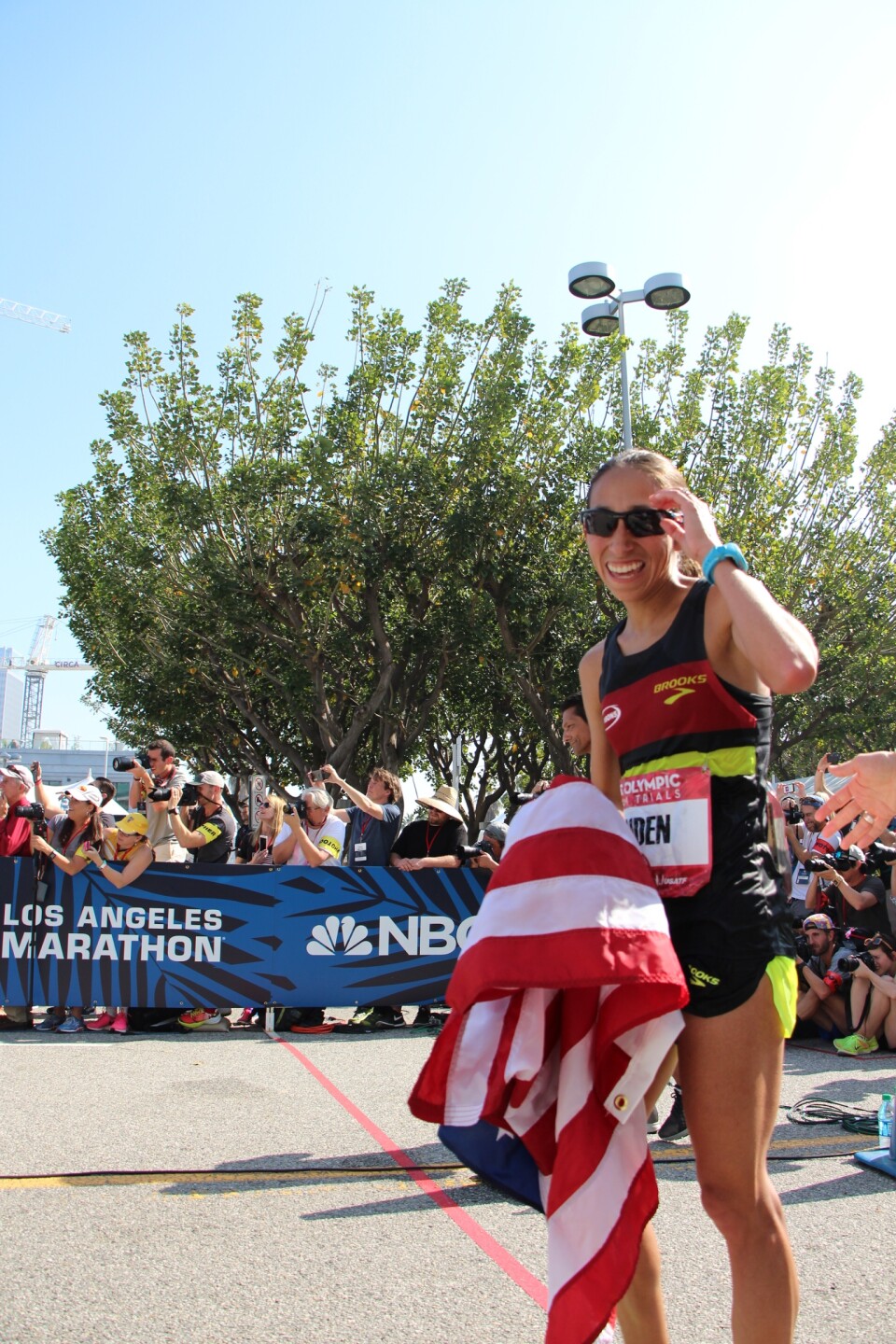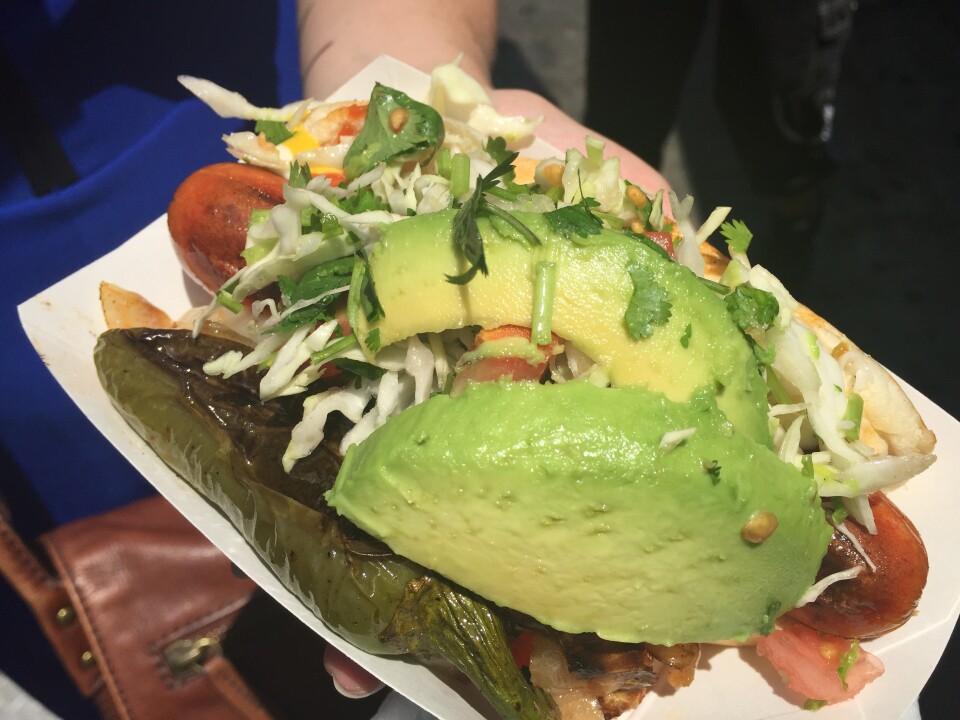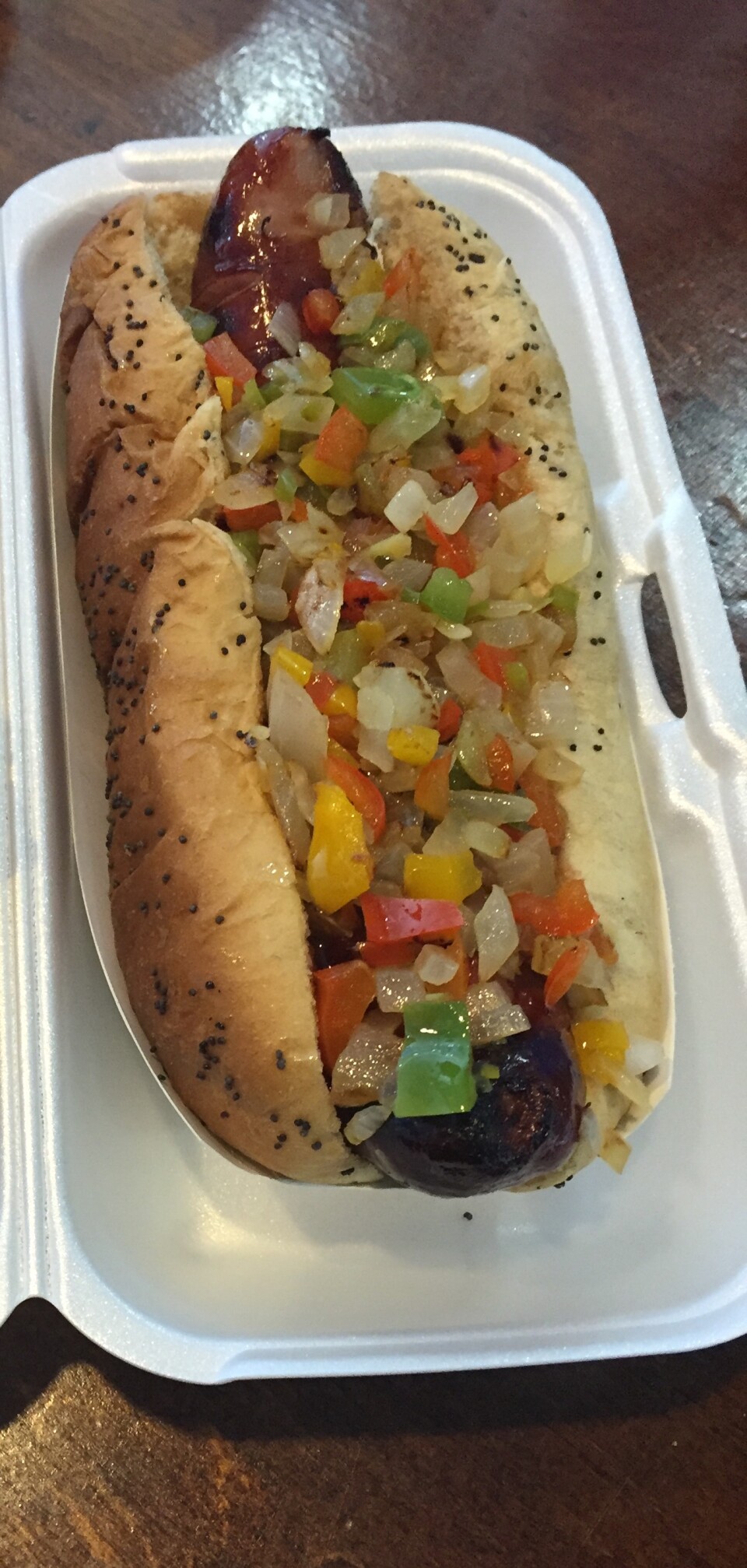What's LA's best hot dog? Fourth of July is around the corner, what you need to know about firework safety, one Olympic athlete's road to redemption in Rio.
Panel clears Border Patrol agents in four shootings
For years, the U.S. Border Patrol has been under pressure to increase transparency and accountability.
After a string of use-of-force incidents, an internal panel was created to review shootings by border patrol agents.
Yesterday, for the first time, the agency released the conclusions of that panel's investigations into four deadly-force cases. In all four cases, the officers were found to have acted properly.
Joining Take Two to discuss:
- , Los Angeles Times National Security Correspondent
Border Patrol would like you to declare your Twitter handle
Cross the border and among the things you might have to declare: your Twitter handle, info about your Facebook account and more.
A proposal floated by US Customs and Border Control would ask people to voluntarily tell agents everything about their social media accounts and screen names.
The idea: to better investigate those who are crossing the border.
Customs officials aren't the only ones who want to peek through your posts.
Some employers already ask their employees to divulge details about what they're doing online, and one service promises to help landlords investigate future tenants by digging through their social media histories.
To look at the way people are trying to scan and survey your social media presence is Russell Brandom, reporter with The Verge.
De-escalation techniques in the police force, are they working?
A new use-of-force policy begins at the Baltimore Police Department today, just as the Department of Justice prepares to issue a report into the behavior of officers there
The changes which put an emphasis on the quote, "Sanctity of life", also come a year after 25-year-old Freddie Gray died in the custody of Baltimore PD. One year ago, the LAPD began training officers to use similar de-escalation techniques. How are they working out?
For more on how the new guidelines will play out in the field, I'm joined by Maria Haberfeld, she's a professor of police science at the John Jay College of Criminal Justice in New York.
To hear the full interview, click the blue play button above.
This Ramadan, breaking the fast while getting to know a new country
For Muslims observing Ramadan, strengthening community is as important as the fast itself. At the end of each day, families typically get together with friends to break the fast and eat, but community can be hard to find for newly arrived refugees in this country.
More than 5,000 people resettled in California last year from countries like Syria, Afghanistan and Iraq, according to the Department of Social Services.
On Monday, a dinner was held in Orange Country to help some of those families get acquainted with their neighbors.
“It’s already hard enough that they’re starting from zero without knowing the language,” says Alan Abdo, who co-owns Olive Tree with his dad. “[We] wanted to show them a side of America where it’s compassionate and welcoming because that’s who we are.”
The sun is setting and 36-year-old Mona Al-Rebdawi is sitting among family, friends and total strangers at the Olive Tree Restaurant in Anaheim’s Little Arabia District. Wearing a long black jacket and beige hijab, this mother of five smiles as she grabs a date to break her fast.
“I can’t even tell you what I’m thinking right now,” Al-Rebdawi says in Arabic. “I’m still in a tough place – very tough.”
She and her family arrived in California six months ago after waiting 5 years to resettle in the U.S. from Syria. Al-Rebdawi, her husband and five sons left after mortar shells struck just outside her home in the city of Daraa. “We couldn’t sleep. If we slept, we wouldn’t know if we’d wake up,” she remembers.
The shelling left the neighborhood and her home in ruins. “That was it. We took our kids and left the country with nothing and we didn’t look back,” Al-Rebdawi says. “We traveled by foot to Jordan.”
To help families like the Al-Rebdawis get settled in their new home, the Arab American Civic Council hosted a dinner with refugees at the Olive Tree. The idea is to give newly arrived refugees a chance to break bread and build relationships with Southern California locals.
“We’re bringing together community members to help welcome new families, new Americans that are here with us in Orange County,” says Rashad Al-Dabbagh, co-founder and director of the Arab American Civic Council as well as one of the event organizers.
On this night, talk about everyday struggles – paying rent, getting credit, and navigating the education system - dominated the dinner table conversation. “We left, and in exchange for fear of violence and death, we are now dealing with different struggles,” Al-Rebdawi says.
Struggles like how to get credit to rent an apartment. “Someone who is new is on their own to find a place to live,” she says. “Then you find a place and you’re told you need strong credit, you have to have a history, you need to get a check from your employer. I’m telling you I’m new here. I still don’t have those things you mentioned. Do I stay in the street?”
For now, they’re getting help from World Relief Garden Grove, but that aid runs out after 90 days. On top of that, her kids are having a hard time making friends. “My kids — of course they’re struggling too,” Al-Rebdawi says. “That’s why I’m trying to give them the best… It’s enough what they’ve seen. It’s enough what they’ve experienced.”
Refugee families like the Al-Rebdawis also face anti-Muslim sentiment that’s grown louder in some parts of the country. More than 40 percent of Americans say that the United States should not accept refugees even with security screenings, according to a poll from the Brookings Institute.
“There are segments of this country that are not welcoming especially with the toxic election season. During this election there are candidates that are using cheap politics,” Al-Dabbagh says, referring to a proposal by presumptive GOP candidate Donald Trump to ban Muslims from coming to the U.S.
Trump needs no introduction for Al-Rebdawi. “Oh yes, Trump. I’ve heard of him,” she says.
She believes Trump has mischaracterized Muslims and refugees. “He doesn’t want Muslims because he thinks all Muslims are terrorists,” Al-Rebdawi says. “But no, Islam is not terrorism. Terrorism is something else. Terrorists are under the cloak of Islam, but they are not Muslims.”
Al-Rebdawi is eager to explain her faith to strangers, but her primary concern is what’s next for her family. Soon they will be moving to Irvine so her kids can attend school there. Then she will look for a job, hopefully, she says, as an Arabic tutor. “We’re still not adjusted, but I have faith that it will get easier God willing,” she says.
An Olympic athlete's race to redemption at the 2016 Rio Olympics
In a little over a month, all eyes will be on Rio as the Olympic Games head to Brazil. San Diego native Desiree Linden will be one of the athletes representing the U.S. women's marathon team.
The long distance runner has built up an impressive running resume. She went to Arizona State university where she was two-time All-American in track and cross country. After that, she started running marathons and joined the Hanson-Brooks team.
As she prepares for the Games, Linden is aware she has a point to prove, if only to herself. Four years ago at the London games, she only managed to run a couple of miles at the women's marathon event. After a particularly tight right turn, she was forced to drop out of the race due to a stress fracture.
You can see her in the video below. Her bib has her maiden name, Davila. Linden is only visible for the first part of the video before she slowly falls back and eventually disappears.
Desiree Linden at 2012 London Olympic Women's Marathon
Desiree joined host, A Martinez earlier to talk about her road to redemption in Rio after her devastating setback at the London 2012 Games.
Interview Highlights
What happened at the London Games?
"You can be your breakthrough or your breakdown and unfortunately, I got the bad end of the deal. Just pushed a little too hard in training and was really beat up by the time I got to the line in London. I had the MRI done and all of these things that said, it's just tendonitis go ahead and give it a try...
I kind of hobbled through a mile or two, and it's like, this could be detrimental to my career if I am going to try and finish this race, so I stepped off. You go from making the Olympic team and then stepping off the course and not even getting to see that finish line so it’s like the highs and lows all compacted into a couple of months. Really challenging but it was also one of the moments where you decide like 'Am I going to give up and just go onto the next thing in life or am I going to figure out what this is, regroup and try again in four years."
What kind of goals did you set for 2016?
"We looked at it as a four-year process, slowly building up from 2012 to '16 and the big goal was to make the team here and I definitely prepared different for the trials.
So we didn't completely smash the training for the trials, I felt like I kind of trained at 95 percent which is still really really hard, but I relied on the three to four years of previous work to kind of get me through and I think it went really well. I was second at the Olympic trials, but I felt that I recovered well and have been able to improve on that since, and it was really kind of the starting point instead of the big goal and so this time, we're putting all the emphasis on the Games."
Take us back to the Olympic trials, how were you feeling that day?
"In LA it was super hot. I was feeling really hot. I think we had one of the warmest trials in history. It was 10:30 race start so the sun was overhead. You can't get overly excited, which is what you want to do and you get caught up in the emotions but you have to be really logical on race day and the marathon's so long that you have to just use your brain and run with your head for the first 20 miles.
The finishing stretch with 400 meters to go or something, it was like that moment where you realize four years of really hard work are going to pay off and you're going to punch the ticket and I just celebrated the whole time. I'm not really one of those people who pumps their fists or any of that stuff but I couldn't help myself, it was such a great atmosphere out there and you think of all the people that have helped you get to that point and it's like 'Ah forget it, I'm just going to go crazy' and it was a blast. It was so much fun."

Let's travel in the future, August 14th, 2016, the big day. What will you be thinking? What will be in your head?
"The Olympics is different. It's special, it's the bigger atmosphere. I think the saying was...'Capture the electricity of the event without being electrocuted by it.' And so, I'm going to take it all in a couple of days before but by the time I get into race week/race day it's going to be business as usual. Different jersey and a lot more inspiration and motivation in my mind. It's still 26.2, it's still running - right foot, left foot, right foot, left foot, so I'm going to keep it basic and just go to the things that got me to the games and hope those will help me have a good race day."
More on Desiree's race to redemption here.
To hear the full interview, click the blue play button above.
Answers have been edited for clarity.
This post has been updated.
A Take Two taste test: LA's best hot dogs, just in time for the 4th of July
Hot dogs are a classic Fourth of July food. But we here at Take Two were curious to know: What's your favorite L.A. hot dog?
Listeners sent their suggestions on Facebook and Twitter, and Libby Denkmann hit the town with producers Francine Rios and Lori Galarreta for a Take Two taste test.
Now, we’re not exactly Jonathan Gold. But each dog did receive a ranking on a scale of 1 to 10 franks. Here's how they stacked up!
Stop #1: Jesus Hot Dogs, downtown L.A.

A bacon-wrapped hot dog loaded with toppings including grilled onions, peppers, fresh avocado, pico de gallo, ketchup, mustard and mayonnaise.
Libby: "The bacon is so crispy, and the avocado, and the tomato, and the cilantro just really cut through." 8 FRANKS
Lori: "The avocado on a hot dog, I never knew could be so delicious. I never knew I needed it until now, and I will never eat hot dogs the same." 9 FRANKS
Francine: "The avocado with the bacon and the mayonnaise is impeccable." 8 FRANKS
Stop #2: Vicious Hot Dogs, North Hollywood

The sweet and spicy kielbasa, topped with a sweet chili glaze and chopped peppers and onions.
Libby: "This is really excellent. Compared to the Jesus hot dog, it doesn't have as many fun toppings. But the actual sausage is so tasty and so unique." 9 FRANKS
Lori: "I like how colorful it is. The onions, the peppers, they're all so neatly diced. It's aesthetically pleasing as well. But I think Jesus might still have a little bit of a lead on this one." 9 FRANKS
Francine: "That's good!" 9 FRANKS
Stop #3: Pink's Hot Dogs, Fairfax

A classic Pink's chili cheese dog, with mustard and onions.
Lori: "That's yummy. I would name this the comfort dog." 8.5 FRANKS
Francine: "My favorite thing about the Pink's hot dog is the actual dog. It's very flavorful, and it's got a little bit of a snap to it when you bite into it, and I appreciate that about a hot dog." 10 FRANKS
Libby: "I have to say though, I like a bolder flavor. I like more of a bite to my chili, the chili doesn't have any spice to it." 6 FRANKS
Other Take Two listener suggestions:
- Slaw Dogs, Woodland Hills
- Portillo's, various locations
- Fritzi Dog, The Grove
Web extra: Two Michelin-star Chef Josiah Citrin says the key to a great hot dog is all in the griddle, and not the grill! Click on the bonus audio above to hear more.
What happened when a Tesla Model S on autopilot crashed
Joshua D. Brown died when his Telsa Model S crashed while on autopilot mode.
His death happened in May but it was announced Thursday by the National Highway Traffic Safety Administration.
It marks the first fatality in an accident involving a car in self-driving mode.
For more on what happened and what this might mean for the future of self-driving cars, The Ride's Sue Carpenter talks to Libby Denkmann.
To hear the whole interview, click on the blue player above
Your guide to fireworks safety: Do's and don'ts
We’re counting down the hours until the Fourth of July weekend so we can hit the beaches and get our grill on, all in a very patriotic fashion.
But as sure as there will be grilling, there will also be fireworks - and with that come some safety concerns.
Fourth of July is always a great concern for fire agencies not only because of the use of fireworks, but the increase of people outdoors camping, recreating and barbecuing, says Daniel Berlant of Cal Fire.
If you plan to handle fireworks, make sure you’re purchasing state-approved ones that have the “safe and sane” seal. Stay away from purchasing them online, from someone’s car trunk or in other states to avoid hefty fines and jail time, says Berlant.
"There’s about 300 communities across California that allow the use of “safe and sane” fireworks, but many communities don’t so you really have to pay attention and ensure that you’re buying those fireworks from a legal stand," says Berlant.
List of communities that allow state-approved fireworks.
Once you have ensured that your fireworks are "safe and sane," always exercise caution when handling. Berlant recommends the following:
- Always read the directions carefully
- Always have a responsible adult in attendance
- Always have a bucket of water or hose handy to submerge used firework and prevent it from rekindling
- Never attempt to re-light or fix a firework that doesn't explode - it might be a dud
If you have pets, you can follow these tips to keep them from hiding in your tub during the festivities.
.



